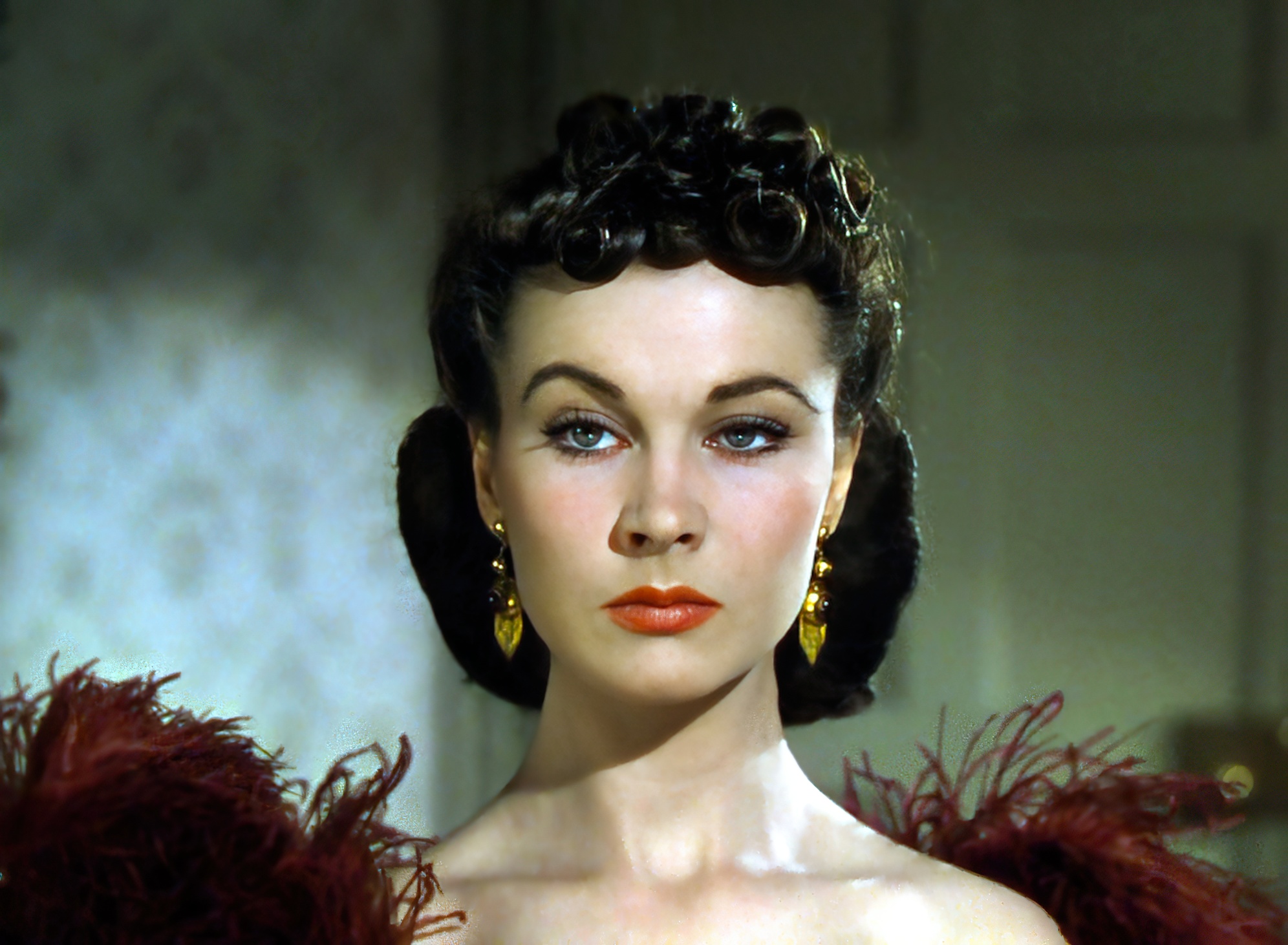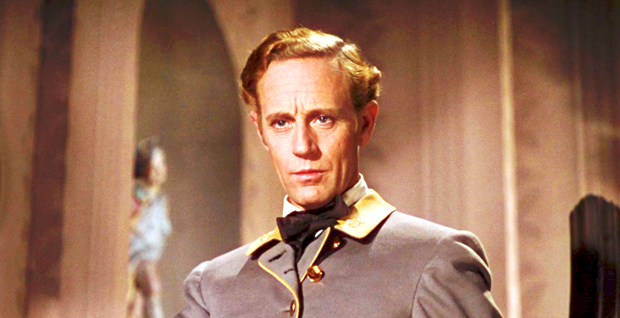
GONE WITH THE WIND (1939)

Clark Gable as Rhett Butler
At the risk of alienating much of the English-speaking world, I must admit that I am not of that huge selection of movie fans who think GWTW is the be-all and end-all in Hollywood movies. It is an entertaining film but it is not a great one, in my opinion. Indeed, it is seriously flawed. Having said that, I hasten to exclude three performers from any criticism. Clark Gable, Vivien Leigh and Hattie McDaniel are outstanding and all three deserved Oscar recognition, although only the two ladies were so honoured. Clark lost out to Robert Donat for his terrific turn in the title role of Goodbye, Mr. Chips, yet I am still astonished by that outcome. Goodbye, Mr. Chips was a much smaller film, shot in black & white, whereas GWTW was an extravaganza filmed in colour. And it must have been seen by every person, male or female, who could vote on the Academy Awards. Furthermore, Gable was the most popular leading man on the planet. He had to win – yet he didn’t! The man must have been devastated. I have seen the picture several times and his performance has not dated one iota. He is Rhett Butler. Everyone who read the book thought he would be an ideal Butler, all except its author Margaret Mitchell who wanted Randolph Scott in the role!

Vivien Leigh as Scarlett O’Hara
English actress Vivien Leigh was an inspired choice to play Scarlett O’Hara and thoroughly deserved her Best Actress Oscar. It has been said she was a last-minute choice, but that seems dubious in the extreme. A production of such magnitude would never leave such an integral piece of casting to chance or to the last moment. Of course, producer David O. Selznick kept the public in suspense, but he had chosen Vivien long before he made the announcement. The only other genuine contender for the role might have been Paulette Goddard whose screen test was very good. She had, however, secretly married Charles Chaplin in 1936, but was reluctant to produce a marriage certificate. The bad publicity surrounding her relationship with him probably told against her in the end.

Hattie McDaniel as Mammy
Hattie McDaniel was a treat as Mammy the house servant. A former big band vocalist, Hattie was the daughter of a slave father (later freed), and was making quite a name for herself playing assertive maids when she landed the Mammy role. Upon learning she had been nominated for Best Supporting Actress, she went to director Victor Fleming and told him she would not be going to the film’s premiere in Atlanta, Georgia. She was only too aware of the blatant racism in the American Deep South at that time and did not wish to be the cause of any trouble. Gable was a friend of hers and threatened to boycott the premiere himself unless she relented. She reluctantly changed her mind and attended. Throughout her career she was continually attacked by the NAACP, for appearing in negative, stereotyped servile roles. Her response? ‘I’d rather play a maid than be one. Why should I complain about making $700 a week playing a maid? If I didn’t, I’d be making $7 a week being one.’

Olivia de Havilland as Melanie Hamilton
As for the flaws in GWTW, there are, in my opinion, three of them. The first (and lesser of the three) is the Melanie Hamilton character portrayed by Olivia de Havilland. She is simply too nice. In scene after scene her character is completely without blemish, perfection itself. She sees only the good in everyone, even in Scarlett, whose selfishness is obvious for all to see. The fact that Scarlett is hell-bent on nailing Melanie’s husband Ashley Wilkes is apparent to everyone within ten thousand kilometres of Tara as well – everyone except Melanie! She floats through the picture like a meringue on cloud nine, oblivious to the shortcomings of all around her. She is so ‘sugary’. Every time she appears on the screen, I feel like I need an insulin shot!

Leslie Howard as Ashley Wilkes
Flaw number two is worse. Two gentlemen named Charles Richards and Fred Schuessler are listed (uncredited) as responsible for casting GWTW. However, it is difficult to imagine Selznick not making the decisions when it came to casting the principal parts. I refer to Scarlet, Rhett, Melanie and Ashley, of course. Leslie Howard was forty-six years old when he took on the Ashley Wilkes role! And he looked it. One wonders what possessed Selznick to select him in the first place. Even Howard himself reckoned he was too old and complained that the silly southern costumes made him look like ‘a fairy doorman’ at a hotel. Nevertheless, cinema-goers were expected to believe that gorgeous, vivacious, free-spirited Scarlett would continually reject handsome, debonair, adventurous Rhett’s advances and pine after stuffy, boring and insipid, middle-aged and married, Ashley! Perhaps, if Howard had played Rhett and Gable had played Ashley, it might have been more believable. But then, of course, who would pay to see Leslie Howard as Rhett Butler? Not me. Anyway, the bottom line was that Howard, despite his serious reservations, took the money and the role. And in doing so he spoilt the picture.
My third and final beef about GWTW has nothing to do with the casting. Nothing whatsoever. It has to do with Ms Mitchell’s ‘Alice in Wonderland’ view of the Deep South, chivalry, honour, integrity and all the other clap-trap that had become (she lamented), ‘a civilization gone with the wind’. Whenever I see the opening of this picture I fast-forward through this disgusting southern sentimental slop rolling across the screen. In case you have forgotten her words, here they are. My apologies to African-Americans everywhere:
‘There was a land of Cavaliers and Cotton Fields called the Old South…Here in this pretty world Gallantry took its last bow…Here was the last ever to be seen of Knights and their Ladies Fair, of Master and of Slave…Look for it only in books, for it is no more than a dream remembered, a Civilization gone with the wind…’ The capitals (I presume) are Mitchell’s, but I cannot be sure of that. The sentiments, of course, are most certainly hers. One wonders, was Selznick unaware that millions of black Americans would probably be seeing his movie and reading that drivel? Or did he simply not care?
Back in 1915, D.W. Griffith created The Birth of a Nation and served up a similar pile of racist garbage to the public. In his horrendous film he portrayed all black Americans as childish, drunken idlers. Worse still, he presented the Ku Klux Klan as heroes, riding to the rescue of the white race! President Woodrow Wilson endorsed his sentiments when he was reported to have described the film thus: ‘It is like writing history with lightning. And my only regret is that it is all so terribly true.’ Really? Gone with the Wind is marginally more subtle but its sentiments are all too familiar. Very little had changed in twenty-four years. I used to watch GWTW to savour Gable’s performance time and again, but not anymore. The picture’s shortcomings outweigh even this, his career-best performance.G

It should be noted that the preamble of the move WAS NOT written by Margaret Mitchell, and in fact doesn’t “most certainly” reflect the sentiments of the author at all. Mitchell included a good deal of criticism about the South and its mores in the book, but the movie focused on the characters’ relationships. If you are going to make such a harsh criticism of an author and a book you obviously haven’t read, you should at least do some research to get your facts straight.
You are right when you say I have not read GWTW. I inexcusably assumed the preamble was lifted from the novel. I shall just have to live with my mistake as best I can. My ‘harsh criticism’ was of the sentiments expressed in that preamble, regardless of who penned them, and I stand by it.
I had never fancied Clark Gable but I fell in love with him as Rhett Butler when I first saw the film as a teenager. Like you, Alan, I couldn’t watch it now.The film was much better than the book, in my opinion. When do you ever say that? Randolph Scott? Perish the thought! Gable and Leigh carried that film.
I couldn’t agree more, Cat. I think it was Gable’s greatest performance but he was up against Donat for ‘Goodbye Mister Chips’. I only EVER watch GWTW to enjoy his and Viv’s performances. The whole ‘poor bleeding South’ mentality makes me want to puke. I can guess what African-Americans think of it!
I rarely see comments from those who’ve read GWTW saying that the movie was better than the book. I think the novel unfortunately gets a bad rap because Mitchell didn’t hold back in portraying the racism during Civil War times, particularly in the characters’ thoughts and actions, and people often confuse those with that of the author’s. Mitchell has a scene in the book where Scarlett confronts a northern woman who refuses to hire a black nanny, entirely due to racism, showing the hypocrisy of many of those who claimed not to be. Of course, compared to today, the racial attitudes of the ’30’s may have something to do with how racism is portrayed, but Mitchell herself was very progressive, and even started a scholarship fund for black medical students in the ’40s.